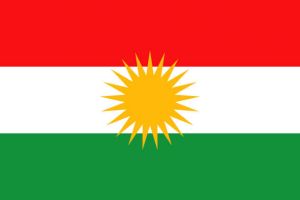Difference between revisions of "Language/Southern-kurdish/Grammar/Adjectives"
m (Quick edit) |
m (Quick edit) |
||
| Line 75: | Line 75: | ||
|description=In this lesson, you will learn about adjectives in Southern Kurdish. Adjectives are words that describe or modify nouns or pronouns. They can express various qualities of the person or thing we are describing, such as size, shape, color, emotion, etc. | |description=In this lesson, you will learn about adjectives in Southern Kurdish. Adjectives are words that describe or modify nouns or pronouns. They can express various qualities of the person or thing we are describing, such as size, shape, color, emotion, etc. | ||
}} | }} | ||
==Related Lessons== | |||
* [[Language/Southern-kurdish/Grammar/Plurals|Plurals]] | |||
* [[Language/Southern-kurdish/Grammar/Pronouns|Pronouns]] | |||
* [[Language/Southern-kurdish/Grammar/Give-your-Opinion|Give your Opinion]] | |||
* [[Language/Southern-kurdish/Grammar/Questions|Questions]] | |||
* [[Language/Southern-kurdish/Grammar/Conditional-Mood|Conditional Mood]] | |||
* [[Language/Southern-kurdish/Grammar/Negation|Negation]] | |||
* [[Language/Southern-kurdish/Grammar/How-to-Use-Be|How to Use Be]] | |||
* [[Language/Southern-kurdish/Grammar/How-to-Use-Have|How to Use Have]] | |||
{{Southern-kurdish-Page-Bottom}} | {{Southern-kurdish-Page-Bottom}} | ||
Revision as of 12:37, 6 March 2023
Hi Southern Kurdish learners! 😊
In this lesson, we will learn about adjectives in Southern Kurdish. Adjectives are words that describe or modify nouns or pronouns. They can express various qualities of the person or thing we are describing, such as size, shape, color, emotion, etc. They are an essential part of our everyday language, and they help us to better express ourselves.
It's essential to learn adjectives since they can help you improve your communication skills and help you express yourself better. Not knowing enough adjectives can make your speech sound dull and uninteresting. However, with regular practice and patience, you can greatly improve your Southern Kurdish vocabulary.
Adjective Formation
In Southern Kurdish, adjectives are not inflected to agree with the grammatical gender of the nouns that they modify. However, adjectives can be modified to match the plurality of the nouns.
Adjectives come after the noun they modify, e.g., "micera sêstra bajarê" (the big three cities). In Southern Kurdish, adjectives do not change form for masculine and feminine. The word "her" is equivalent to the English word "every," and it comes before the adjective, eg., "her nevrozî" (every new year).
To form an adjective, you usually add the suffix "-î" to the end of a noun. For example, "bajar" means "city," but "bajarî" means "urban." Here are a few examples:
| Southern Kurdish | Pronunciation | English |
|---|---|---|
| bajarî | bah-jah-REE | urban |
| berfirehî | ber-fee-REH-ee | spacious |
| zêrînî | zehr-EE-nee | golden |
Comparison of Adjectives
In Southern Kurdish, adjectives have three degrees of comparison: positive, comparative, and superlative. The comparative form is used to compare two objects, while the superlative form is used to compare three or more objects. Here are some examples:
Positive: "min jî jongir im" (I am also young)
Comparative: "min re jêr ji te hatim" (I am taller than you)
Superlative: "hevpeymaniya me bi tenê ye" (We are the tallest)
Remember that to form the comparative degree, you add "-re" to the end of the adjective. To form the superlative degree, you add "-tirîn" to the end of the adjective.
Irregular Adjectives
Some adjectives in Southern Kurdish do not follow the usual "-î" pattern, and they have their unique forms. Here are some examples:
| Southern Kurdish | Pronunciation | English |
|---|---|---|
| navdar | nav-DAR | famous |
| pîroz | pee-ROH-z | victorious |
| şirîn | sheer-EEN | sweet |
Dialogue
Person 1: Ez belayêm li vir! (I am tired here!)
Person 2: Dîsa, mi kola te jiwan bî! (Again, your presence brings joy to life!)
Person 1: Merivên lal dimînin di nav kompleyê de. (Silent people are living in the complex.)
Person 2: Ne rûmet e jiyan bê deng û cûda! Bi hêrs û şolhistinên wî rûmeta we tê dayîn! (Living without sound and separation is not honor, with his courage and firmness, he brings you honor!)
Conclusion
Well done! You have now learned about adjectives in Southern Kurdish. Remember that regular practice is essential to improve your vocabulary. Try to use these adjectives in your everyday conversations, and you will see an astonishing improvement in your Southern Kurdish language skills. To improve your Southern Kurdish Grammar, you can also use the Polyglot Club website. Find native speakers and ask them any questions! Don't forget to check [Language/Southern-kurdish/Grammar|Grammar] section on the Polyglot Club website for more lessons on Southern Kurdish grammar. Thank you for reading!
➡ If you have any questions, please ask them in the comments section below.
➡ Feel free to edit this wiki page if you think it can be improved. 😎
